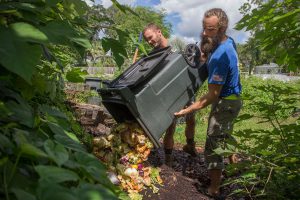Food waste is a significant global issue with far-reaching economic, environmental, and social consequences. According to the United Nations Food and Agriculture Organization (FAO), approximately one-third of all food produced for human consumption is lost or wasted each year. This represents a considerable loss of resources and contributes to various sustainability challenges, including hunger, greenhouse gas emissions, and the degradation of natural ecosystems. Surprisingly, nearly 40% of all food in America is wasted. Food goes to waste at every stage of food production and distribution – from farmers to packers and shippers, from manufacturers to retailers to our homes. Food waste in our homes is about 39% of all food waste – about 42 billion pounds.
The Impact of Food Waste
Economic Impact
Food waste has a substantial economic impact. Families and individuals waste money when they throw away uneaten food, and the economic consequences are even more significant globally. The FAO estimates that the annual economic cost of food waste is around $1 trillion.
Environmental Impact
Food waste is a significant contributor to environmental problems. When food is wasted, all the resources used in its production, including water, land, energy, and transportation, are also wasted. Furthermore, decomposing food in landfills generates methane, a potent greenhouse gas contributing to climate change.
Social Impact
Despite the alarming rate of food waste, millions of people worldwide suffer from hunger and malnutrition. If food currently wasted could be redistributed to those in need, it could make a substantial difference in combating global hunger.
Strategies to Reduce Food Waste
Food Planning and Management
Proper planning and management can significantly reduce food waste at the household level. This includes creating shopping lists, using perishable items before they spoil, and storing food correctly to prolong its shelf life.
Educational Initiatives
Public awareness and education campaigns can inform people about the impact of food waste and how they can reduce it. Governments and non-profit organizations are crucial in spreading knowledge about responsible food consumption. Food Recovery and Donation
Food Recovery and Donation
Food recovery programs collect surplus food from restaurants, supermarkets, and other sources and redistribute it to those in need. This approach helps combat food waste while addressing food insecurity.
Standardizing Portion Sizes
Restaurants and food service establishments can reduce food waste by offering standardized portion sizes, thus ensuring that customers receive the right amount of food and reducing plate waste.
 Food Preservation Techniques
Food Preservation Techniques
Preservation techniques such as canning, freezing, and drying can help extend the shelf life of perishable items, reducing the likelihood of food spoilage.
Reducing “Best Before” Labels
Manufacturers and retailers can play a role by reconsidering “best before” and “use by” dates, often leading to premature food disposal. A more flexible approach to labeling could help reduce waste.
Conclusion
Food waste is a pressing issue that affects economies, ecosystems, and societies globally. By understanding its impact and implementing effective strategies to reduce it, we can make a significant difference in addressing hunger, conserving resources, and mitigating the environmental impact of food production. Individuals, communities, businesses, and governments must work together to combat food waste and build a more sustainable future. For information on food preservation, see the USDA canning guide https://nchfp.uga.edu/publications/publications_usda.html#gsc.tab=0.
Citation:
Food and Agriculture Organization (FAO). (2011). Global Food Losses and Food Waste. Retrieved from http://www.fao.org/3/i2697e/i2697e.pdf
 6
6
